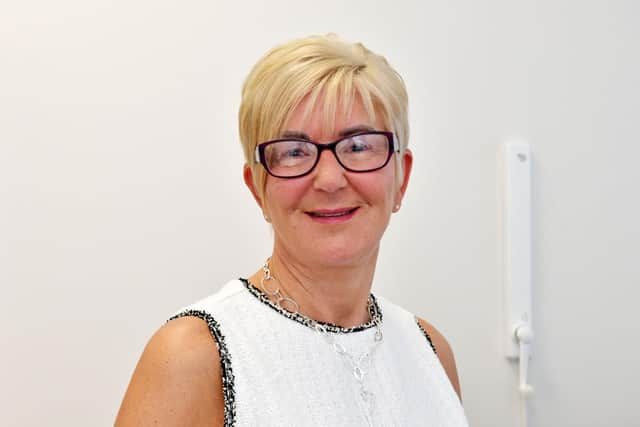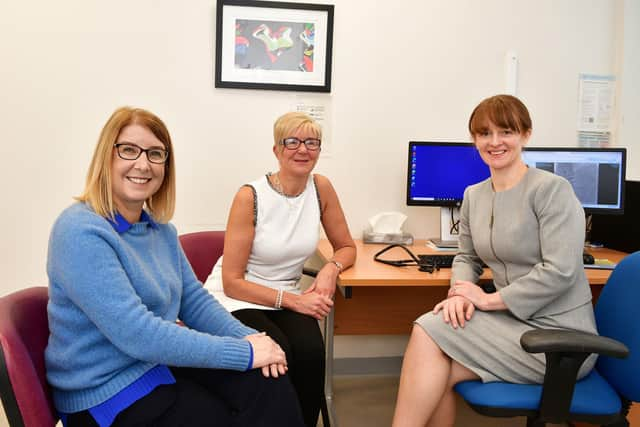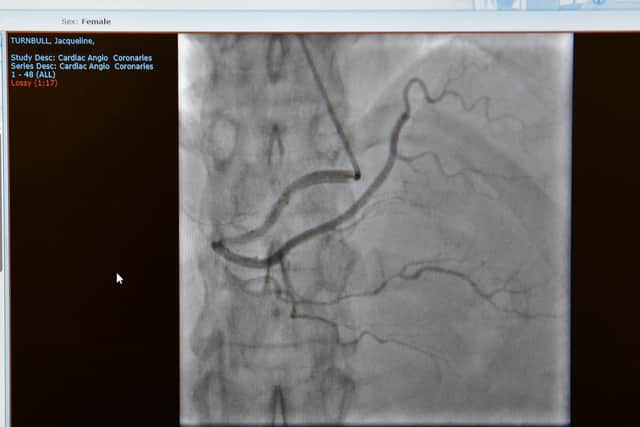NHS Forth Valley: Camelon gran reveals shock at heart attack brought on by rare condition SCAD
and live on Freeview channel 276
NHS worker Jackie Turnbull, 60, was even more surprised when tests revealed it had been caused by a rare condition called Spontaneous Coronary Artery Dissection (SCAD).
It occurs suddenly when a layer of a coronary artery tears away from the outer layer. Blood is able to flow into the space between the layers and a blood clot forms, reducing the flow of blood through the artery.
Advertisement
Hide AdAdvertisement
Hide AdThe condition can happen to anyone but is most common in healthy women, aged in their 40s and 50s. Most people who have SCAD do not have usual risk factors for heart disease such as high cholesterol, smoking or diabetes.


Jackie is now a patient at a new specialist heart clinic being piloted at Forth Valley Royal Hospital in a bid to improve treatment for SCAD.
The new clinic is being trialled over a two-year period with the support of a number of leading researchers and clinicians, including Dr Dave Adlam, a cardiologist and leading UK expert on SCAD who previously patients in Scotland had to travel to his clinic in Leicester for treatment.
Working alongside him are Professor Lis Neubeck from Edinburgh Napier University’s Centre for Cardiovascular Health, and Dr Anne Scott, a consultant cardiologist at Forth Valley Royal Hospital.
Advertisement
Hide AdAdvertisement
Hide AdIt is estimated that around 50 people a year in Scotland will experience a heart attack caused by SCAD, many of them younger women with no previous health issues.


In Jackie’s case her first symptoms of the heart attack came on unexpectedly when she was visiting her mother on November 22 last year. “I felt this pain across my shoulders but wasn’t aware that I’d twisted myself,” she said. “I then left and went to Tesco and it was there that I began to have a pain in my jaw, felt nauseous and really felt out of it. I suffer from migraines and thought one was coming on.
"I got some paracetamol and thought that would work. But I knew that I wasn’t right so made a GP’s appointment for later that day. When I attended and spoke to the doctor they referred me to the hospital straight away.
"Very quickly they carried out an electrocardiogram (ECG), took bloods and gave me an x-ray and within an hour I was in a bed. It was all a bit surreal.”
Advertisement
Hide AdAdvertisement
Hide AdAlthough doctors at Forth Valley Royal Hospital suspected Jackie had SCAD, it was only after further tests in Edinburgh that she was diagnosed.


She then spent five days in hospital, was given aspirin and beta blockers and told to rest.
Jackie added: “I had no more pain during my hospital stay but mentally and emotionally it was all very difficult to comprehend.
"I’d gone from being this really fit person who would run five times a week to someone who had been diagnosed with a heart condition. I’ll admit that I struggled at times.”
Advertisement
Hide AdAdvertisement
Hide AdThankfully Jackie is now back at work – and running again, although limiting herself to only training twice a week. However, in October she successfully completed a 10k in Linlithgow.
"I’ve had a lot of support from my husband Jim, daughter Kirsty and twin granddaughters, Kendall and Kayla, who are 11. But my friend Anne Donoghue has also been a huge support going out running with me. She’s always telling me we’ll take it easy and to keep at a steady pace. She is first-aid trained but hopefully she’ll never need to use it.”
Jackie, who lives and works in Camelon, now attends the SCAD clinic at FVRH where regular checks are carried out and she is delighted that the pilot is running. “The specialist advice and support I have received from Dr Scott and her colleagues has increased my confidence and knowledge of what do if I start to feel unwell.”
Dr Scott said: “The pilot clinics have been up and running for a few months and we are starting to see referrals coming through from cardiology colleagues across Scotland, including as far afield as Orkney.
Advertisement
Hide AdAdvertisement
Hide Ad“The feedback from patients attending so far has been really positive and we are hoping that that the pilot will lead to greater understanding of this condition and better outcomes for the people affected."
Professor Neubeck said: “I’m delighted that we have been able to develop this pilot service for SCAD survivors in Scotland. Our work with SCAD survivors highlighted the physical and psychological challenges they face following a SCAD diagnosis and this service will help to give then the support they need to recover.”
Dr Dave Adlam said: “I am enormously excited that we are now able to offer a dedicated service for patients with SCAD in Scotland. We hope, over time, that the clinic at Forth Valley Royal Hospital will transform access to the very best care for both SCAD patients and clinical staff involved in their care.”